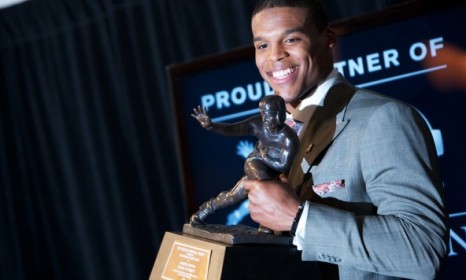Top 5 'pay to play' scandals rocking college football
More and more NCAA players have broken the rules by taking money from agents or boosters. Is the system fundamentally broken?

A free daily email with the biggest news stories of the day – and the best features from TheWeek.com
You are now subscribed
Your newsletter sign-up was successful
Controversy is hardly new to college football — every year, fans rail against the much-maligned BCS system used to crown a champion. But as the 2010 season winds down, the focus is on a different kind of imbroglio: The growing number of players who have accepted money to play what's supposed to be an amateur sport. What all these scandals illustrate, says Frank Deford at NPR, is that the current model for "big-time college football just doesn't work" now that the sport "is a billion-dollar enterprise." And everybody involved, "except the players themselves," is making lots of money. (Watch a report about college football's scandals.) Here's a look at five recent scandals that have prompted a vigorous debate about the the National Collegiate Athletic Association's rules:
1. Cam Newton's eligibility
The highest-profile college-football controversy this year centered around dominant Auburn quarterback Cam Newton. Midway through the season, allegations surfaced that before Newton landed at Auburn, his father had indirectly demanded $180,000 from Mississippi State for his son's services, a clear rules violation. The NCAA announced Newton would be ineligible to play — then quickly reversed course in a ruling that "left cynics rolling their eyes," says Ted Lewis at the Times-Picayune. Newton went on to win the Heisman Trophy — but, says Lewis, despite the NCAA's pledge to "curb agents and their representatives from tampering with still-eligible players, few expect the practice to change."
The Week
Escape your echo chamber. Get the facts behind the news, plus analysis from multiple perspectives.

Sign up for The Week's Free Newsletters
From our morning news briefing to a weekly Good News Newsletter, get the best of The Week delivered directly to your inbox.
From our morning news briefing to a weekly Good News Newsletter, get the best of The Week delivered directly to your inbox.
2. Ohio State players sell rings
Last week, five Ohio State players, including marquee quarterback Terrelle Pryor, confessed to selling their conference championship rings on eBay, as well as accepting improper discounts from a local tattoo parlor over a period of at least two years. The players were suspended for the first five games of the 2011 season, yet were allowed to play in Tuesday's Sugar Bowl game. "As everyone knows, the NCAA prohibits tattoos unless they are dollar signs on the eyelids of athletic directors," says David Whitley at Fanhouse. Given their transgressions, it's absurd that the players were allowed to compete in the bowl game, but "as a fan of hypocrisy and great football at all costs, I saw the finest bowl game in history."
3. Reggie Bush gives back Heisman
In September, the former University of Southern California running back, who now plays for the NFL's New Orleans Saints, was forced to return his Heisman trophy from 2005 after an investigation found that, while in college, he accepted illegal gifts worth $300,000 from marketing agents. The ruling prompted many observers to rail against the perceived hypocrisy of the NCAA, which does not pay its players but profits from their on-field achievements. Since Bush was forced to renounce his past glories, said Jemele Hill at ESPN, "when will USC pay back all the money it earned because of Bush's stardom?"
A free daily email with the biggest news stories of the day – and the best features from TheWeek.com
4. Agent confesses to paying players
In a blockbuster exposé for an October issue of Sports Illustrated, former agent Josh Luchs wrote that he illegally paid at least 30 college football players from 1990 to 1996, including big names like former Washington State quarterback Ryan Leaf. Luchs' article took the "inner workings of an oily business out of the shadows" and showed readers just how "pervasive" the improper payments really are, said Pat Forde at ESPN. For his part, Luchs said, "I'm not sorry that I helped people. I don't regret giving these guys money."
5. North Carolina suspends twelve players
During North Carolina's "scandal-ridden" season, five players were kicked off the team for taking money from agents, while nine players were removed for a game pending investigations into academic misconduct. An agent involved in the scandal was suspended by the NFL Players Association in October. It's unclear whether the UNC program will face sanctions in seasons to come, but despite the controversies, head coach Butch Davis will be back in 2011.
-
 What is the endgame in the DHS shutdown?
What is the endgame in the DHS shutdown?Today’s Big Question Democrats want to rein in ICE’s immigration crackdown
-
 ‘Poor time management isn’t just an inconvenience’
‘Poor time management isn’t just an inconvenience’Instant Opinion Opinion, comment and editorials of the day
-
 Bad Bunny’s Super Bowl: A win for unity
Bad Bunny’s Super Bowl: A win for unityFeature The global superstar's halftime show was a celebration for everyone to enjoy